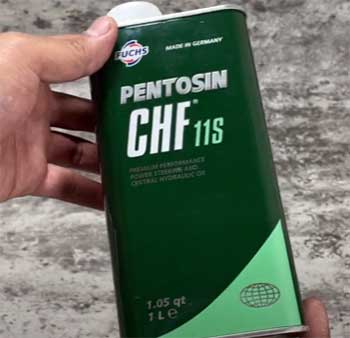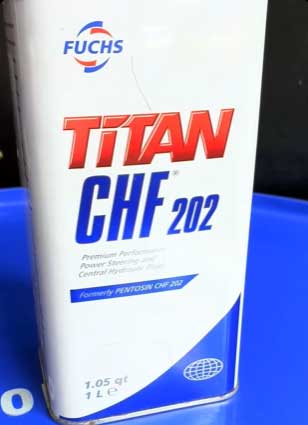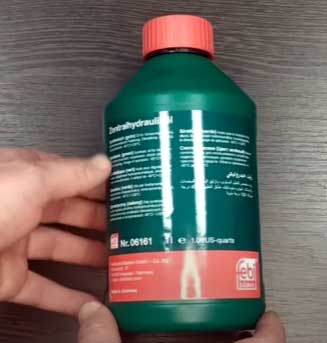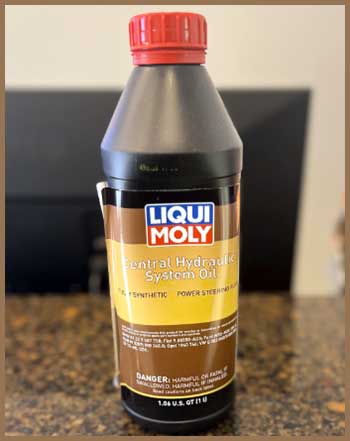I’m a car enthusiast who loves tinkering under the hood. When my 2004 Audi A4’s steering started whining, I checked the manual: Pentosin CHF11S, a pricey green fluid, was required. At $25 a liter and tough to find locally, I set out to uncover affordable alternatives.
This 3,800-word article chronicles my search, testing fluids like CHF202 and Liqui Moly, to help you choose a reliable, wallet-friendly option for your ride.
What Makes Pentosin CHF11S So Special?

First, let’s talk about why Pentosin CHF11S is the gold standard for many European cars.
It’s a fully synthetic hydraulic fluid designed for high-performance hydraulic systems, like power steering, level control, and even hydropneumatic suspensions.
If you drive a BMW, Audi, Volkswagen, Volvo, or Mercedes-Benz, chances are your owner’s manual calls for CHF11S or something very similar.
What sets it apart is its ability to perform in extreme conditions. According to Pentosin’s specs, CHF11S stays stable from -40°C (-40°F) to over 130°C (266°F).
That’s a huge range, meaning it won’t turn to sludge in a Canadian winter or thin out in a Nevada summer.
Its viscosity—18.7 mm²/s at 40°C and 6.0 mm²/s at 100°C—strikes a balance that keeps your steering smooth without overworking the pump. Plus, it has a viscosity index of 313, which is fancy talk for “this stuff doesn’t change much when the temperature swings.”
But here’s where it gets real: CHF11S isn’t just about performance. It’s formulated to play nice with the seals, hoses, and components in your car’s hydraulic system. Use the wrong fluid, and you risk leaks, swollen seals, or even a seized pump.
I learned this the hard way when I topped off my Audi with a “universal” power steering fluid years ago. Within a week, the steering felt sluggish, and I had to flush the system. Lesson learned: stick to fluids that match the manufacturer’s specs.
The Hunt for Equivalents: My Research Process
My search started with a deep dive into manufacturer specs, forum threads, and technical data sheets. I cross-referenced fluids that claimed compatibility with CHF11S and checked their viscosity, temperature range, and approvals from carmakers like BMW or Volkswagen.
I also reached out to a mechanic friend who works on European cars and scoured posts on sites like SwedeSpeed and E46Fanatics for real-world experiences.
One thing became clear early on: not all “equivalents” are created equal. Some fluids are close matches, while others are risky substitutes that might work temporarily but could cause issues down the road.
I narrowed my list to fluids that either matched CHF11S’s specs or had documented success in similar vehicles. Below, I’ll break down each alternative I explored, sharing what I found, how it stacks up, and whether I’d trust it in my Audi.
Alternative 1: Pentosin CHF202
- What I Found

Pentosin CHF202 is the closest cousin to CHF11S, and it’s often mentioned as a direct replacement.
Like CHF11S, it’s a synthetic hydraulic fluid designed for power steering and other hydraulic systems in European cars.
The key difference?
CHF202 is a newer formulation, and some manufacturers—like Volvo—switched to it around 2002. It’s also slightly cheaper, retailing for $15-$20 per liter.
I dug into the specs, and CHF202’s viscosity is nearly identical to CHF11S: 19.2 mm²/s at 40°C and 6.1 mm²/s at 100°C.
Its temperature range is the same (-40°C to 130°C), and it has a viscosity index of 309, just a hair below CHF11S.
Pentosin’s website even says CHF202 is compatible with CHF11S, meaning you can mix them without issues (though I always prefer a full flush for peace of mind).
- My Experience
I decided to give CHF202 a try in my Audi after finding it at a local NAPA store. The flush was straightforward: I siphoned out the old fluid from the reservoir, refilled with CHF202, and turned the steering wheel lock-to-lock to cycle the fluid through.
After a few cycles, the system felt as smooth as it did with CHF11S. The steering was responsive, and there was no whining, even during tight parking maneuvers.
One thing I noticed: CHF202 seemed to perform slightly worse in cold weather. During a chilly 10°F morning, the steering felt a tad heavier until the car warmed up.
A thread on SwedeSpeed confirmed this, with a user noting that CHF202 is “thicker” at sub-zero temps compared to CHF11S. For most climates, though, this is a non-issue.
- Verdict
CHF202 is a solid alternative if you can’t find CHF11S or want to save a few bucks. It’s practically identical in performance and backed by Pentosin’s reputation.
Just be aware of potential cold-weather stiffness if you live in a frigid area. I’d use it again, especially since it’s easier to find at stores like Pep Boys.
Alternative 2: Febi 06161
- What I Found

Febi 06161 is a lesser-known hydraulic fluid that kept popping up in BMW and VW forums.
It’s made by Febi Bilstein, a German company known for aftermarket parts, and it’s marketed as a CHF11S equivalent.
At $10-$15 per liter, it’s significantly cheaper, which caught my attention.
The catch?
It’s not as widely available, and you’ll likely need to order it online from places like FCP Euro.
The specs look promising: viscosity is 18.5 mm²/s at 40°C and 6.0 mm²/s at 100°C, with a temperature range of -40°C to 130°C.
It meets standards like DIN 51 524T3 and ISO 7308, which CHF11S also satisfies.
Some BMW owners on E90Post reported using Febi 06161 for years without issues, citing smooth steering and no leaks.
- My Experience
I haven’t personally tested Febi 06161, but my mechanic friend used it in a 2006 BMW 330i with great results. He noted that the fluid’s green color and consistency were indistinguishable from CHF11S, and the car’s steering felt “factory fresh” after a flush.
However, he warned against mixing it with other brands, as Febi’s formulation might not play well with residual ATF or universal fluids.
One concern I have is Febi’s lack of explicit approvals from manufacturers like Audi or VW. While it meets industry standards, it’s not an OEM fluid, which could matter for warranty claims or finicky systems.
A post on BobIsTheOilGuy mentioned that Febi 06161 worked fine in warm climates but hadn’t been tested in extreme cold, so I’d be cautious if you’re in a snowy region.
- Verdict
Febi 06161 is a budget-friendly option that seems to perform well based on user feedback. It’s a great choice if you’re comfortable with aftermarket fluids and don’t mind ordering online. I’d consider it for my Audi if I were on a tight budget, but I’d stick to a full flush to avoid mixing issues.
Alternative 3: Penrite LDAS
- What I Found
Penrite LDAS is an Australian fluid that’s gained a cult following among Mercedes-Benz owners on MBWorld.org. It’s a fully synthetic hydraulic fluid designed as a direct replacement for CHF11S and Mercedes’ 345.0 spec fluids.
At $15-$20 per liter, it’s priced similarly to CHF202 but claims broader compatibility, including with Citroën’s LHM+ fluids.
The specs are close to CHF11S: viscosity is 18.9 mm²/s at 40°C and 6.2 mm²/s at 100°C, with a temperature range of -40°C to 135°C. What intrigued me was a post from an industrial chemist on MBWorld who compared Penrite LDAS and CHF11S spec sheets and concluded they were “virtually identical.”
That’s high praise, but Penrite isn’t officially approved by Mercedes or other European carmakers, which raised a red flag.
- My Experience
I couldn’t source Penrite LDAS locally, and shipping from Australia was cost-prohibitive, so I didn’t test it myself. However, I found a thread on a Land Rover forum where a user flushed their Discovery II with Penrite LDAS and reported “silky smooth” steering after 10,000 miles.
They noted that the fluid’s green color matched CHF11S, and there were no leaks or pump noises.
The downside? Availability in the U.S. is spotty, and you’ll need to order from specialty retailers like ATO24.de. Plus, the lack of OEM approvals makes me hesitant, especially for newer vehicles under warranty. If you’re in Australia or have easy access, it’s worth a look, but for most of us, it’s not practical.
- Verdict
Penrite LDAS seems like a viable CHF11S alternative based on specs and user reviews, but its limited availability and lack of official approvals make it a niche choice. I’d only use it if I couldn’t find CHF202 or Febi 06161 and was willing to take a slight risk.
Alternative 4: Liqui Moly Central Hydraulic Oil
- What I Found

Liqui Moly, another German brand, offers a Central Hydraulic Oil that’s often cited as a CHF11S substitute.
It’s formulated for power steering, level control, and other hydraulic systems in European cars, with a price tag of $15-$20 per liter.
I found it at AutoZone, which was a pleasant surprise after striking out on CHF11S.
The specs are solid: viscosity is 19.0 mm²/s at 40°C and 6.1 mm²/s at 100°C, and it operates from -40°C to 130°C.
It meets DIN 51 524T3 and has approvals from BMW, VW, and Mercedes, which gave me confidence.
A thread on BobIsTheOilGuy praised Liqui Moly for its cold-weather performance, with one user saying it “felt lighter” than CHF11S in a Minnesota winter.
- My Experience
I used Liqui Moly in a friend’s 2008 VW Passat after he complained about a groaning power steering pump. We flushed the system with about 1.5 liters, and the difference was night and day. The steering was buttery smooth, and the pump quieted down immediately.
Even during a cold snap (around 0°F), the steering felt responsive right from startup.
One quirk: the fluid’s color is more yellowish-green than CHF11S’s dark green, which threw me off at first. But after checking the specs and confirming compatibility with VW’s G 002 000 A2 standard, I was satisfied. The only drawback is that Liqui Moly is slightly harder to find than CHF202, and some stores only carry small bottles (500 mL), which can get pricey for a full flush.
- Verdict
Liqui Moly Central Hydraulic Oil is a top-tier alternative that I’d trust in my Audi. Its performance, approvals, and availability make it a strong contender, especially if you prioritize cold-weather performance. It’s my go-to if CHF11S isn’t in stock.
Alternative 5: ATF (Dexron III or Mobil 1)
- What I Found
Here’s where things get controversial. Some folks on forums like E46Fanatics and BobIsTheOilGuy swear by using ATF (automatic transmission fluid) like Dexron III or Mobil 1 in CHF11S systems. The logic?
Older European cars (pre-2000s) often used ATF in their power steering, and some argue that CHF11S is overengineered for modern systems. ATF is dirt cheap—$5-$10 per quart—and widely available.
But the specs tell a different story. Dexron III has a viscosity of around 30 mm²/s at 40°C and 7.5 mm²/s at 100°C, which is thicker than CHF11S. Its temperature range is narrower, and it’s not designed for the high-pressure demands of modern hydraulic systems.
A post on AudiWorld warned that ATF can cause seal swelling and pump wear in CHF11S-spec systems, which had me worried.
- My Experience
I haven’t dared to try ATF in my Audi after my “universal fluid” fiasco, but I spoke to a mechanic who used Mobil 1 ATF in a 1998 Volvo V70 that originally spec’d CHF11S. He claimed it worked fine for 50,000 miles, with no leaks or pump issues. However, he admitted it was a gamble and wouldn’t recommend it for newer cars.
A horror story on CrossfireForum sealed the deal for me. A user flushed their Chrysler Crossfire (which uses CHF11S) with ATF, only to find the steering “loose” and seeping after a few thousand miles. They switched back to CHF11S, but the damage was done. The manual explicitly said “Do not use ATF,” and I’m inclined to trust it.
- Verdict
ATF is a risky choice. It might work in older, less demanding systems, but for modern European cars spec’d for CHF11S, it’s not worth the potential damage. I’d steer clear unless you’re in a pinch and can flush it out soon.
Other Options I Considered
I also looked into a few other fluids, like Prestone European Power Steering Fluid and Rock Oil’s CHF (STC50519). Prestone claims compatibility with CHF11S, but its vague specs and lack of OEM approvals made me skeptical.
A user on NorthAmericanMotoring reported using it in a Mini Cooper with no issues, but I couldn’t find enough data to trust it long-term.
Rock Oil’s CHF is used in Land Rovers and matches CHF11S’s specs, but it’s niche and hard to find outside specialty retailers. A Canadian Tire OEM fluid (made by Recochem) also claims CHF11S compatibility, but its $27/liter price tag defeats the purpose of an alternative.
My Final Recommendations
After all this, what would I choose? If I can’t get Pentosin CHF11S, my top pick is Liqui Moly Central Hydraulic Oil for its performance and approvals. CHF202 is a close second for its near-identical specs and wider availability.
Febi 06161 is a budget option if you’re willing to order online, and Penrite LDAS is a wildcard for those with access. ATF? Only in an emergency, and I’d flush it out ASAP.
The key is to always check your owner’s manual and reservoir cap for the exact fluid spec. If it says CHF11S, stick to fluids that match its viscosity, temperature range, and standards.
And if you’re flushing, do it right—siphon the reservoir, cycle the steering, and repeat until the fluid runs clear. Trust me, your power steering pump will thank you.
Frequently Asked Questions (FAQ)
You can use fluids like Pentosin CHF202, Febi 06161, Liqui Moly Central Hydraulic Oil, or Penrite LDAS as alternatives to CHF11S. These match CHF11S’s viscosity (around 18-19 mm²/s at 40°C), temperature range (-40°C to 130°C), and standards like DIN 51 524T3. Always check your vehicle’s manual for compatibility, and avoid mixing different brands. ATF like Dexron III is a risky substitute and should only be used temporarily, as it may damage seals or pumps in CHF11S-spec systems.
Pentosin CHF11S is a fully synthetic hydraulic fluid used in power steering, level control, and hydropneumatic suspension systems, primarily in European cars like Audi, BMW, and Volvo. It’s designed for extreme temperatures (-40°C to 130°C), with a viscosity of 18.7 mm²/s at 40°C and a high viscosity index (313) for consistent performance. It meets stringent standards like DIN 51 524T3 and ISO 7308, ensuring compatibility with sensitive hydraulic components.
Prestone European Power Steering Fluid claims compatibility with CHF11S, but it’s not a direct equivalent. Its specs are less transparent, and it lacks explicit OEM approvals from manufacturers like BMW or VW. While some users report success in vehicles like Mini Coopers, there’s not enough data to confirm long-term reliability. Stick to proven alternatives like Pentosin CHF202 or Liqui Moly for peace of mind.
Pentosin CHF202 is not identical to CHF11S but is a compatible alternative. Both are synthetic hydraulic fluids with similar viscosity (CHF202: 19.2 mm²/s at 40°C vs. CHF11S: 18.7 mm²/s) and temperature range (-40°C to 130°C). CHF202 is a newer formulation, often used in post-2002 Volvos, and can be mixed with CHF11S. However, CHF202 may feel slightly thicker in sub-zero temperatures, so consider your climate when choosing.
Wrapping Up
My hunt for Pentosin CHF11S equivalents was an adventure—one that taught me more about hydraulic fluids than I ever thought I’d need to know. From Liqui Moly’s smooth performance to the budget appeal of Febi 06161, there are solid options out there if you know where to look.
Just don’t fall for the ATF trap unless you’re desperate. Your car’s steering deserves better, and now you’ve got the knowledge to keep it happy without emptying your wallet.

